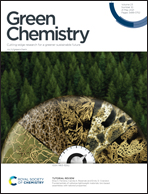Nanocellulose-based mechanically stable immobilization matrix for enhanced ethylene production: a framework for photosynthetic solid-state cell factories†
Abstract
Cell immobilization is a promising approach to create efficient photosynthetic cell factories for sustainable chemical production. Here, we demonstrate a novel photosynthetic solid-state cell factory design for sustainable biocatalytic ethylene production. We entrapped cyanobacteria within never-dried hydrogel films of TEMPO-oxidized cellulose nanofibers (TCNF) cross-linked with polyvinyl alcohol (PVA) to create a self-standing matrix architecture. The matrix is operational in the challenging submerged conditions and outperforms existing alginate-based solutions in terms of wet strength, long-term cell fitness, and stability. Based on rheological investigations, the critical strength of wet TCNF matrices is three times higher than in the existing immobilization matrices of alginate cross-linked with Ca2+. This is due to the rigid nature of the colloidal nanofiber network and the strong cross-linking with PVA, as opposed to polymeric alginate with reversible ionic Ca2+ bonds. The porous and hygroscopic nanofiber network also shields the cyanobacterial cells from environmental stress, maintaining photosynthetic activity during partial drying of films, and when submerged in the nutrient medium for long-term cultivation. Finally, TCNF matrices allow the ethylene-producing Synechocystis sp. PCC 6803 cells to operate in submerged conditions under high inorganic carbon loads (200 mM NaHCO3), where Ca2+-alginate matrices fail. The latter show severe cell leakage due to matrix disintegration already within 20 min of NaHCO3 supplementation. In contrast, TCNF-based matrices prevent cell leakage to the medium and restrict culture growth, leading to improved ethylene production yields. Furthermore, the operational capacity of the self-standing TNCF cell factory can be maintained long-term by periodically refreshing the nutrient medium. All in all, the results showcase the versatility and potential of cell immobilization with the never-dried colloidal TCNF matrix, paving the way towards novel biotechnological pathways using solid-state cell factories designed for efficient and sustainable production of e.g., monomers and fuels.

- This article is part of the themed collection: 2021 Green Chemistry Hot Articles


 Please wait while we load your content...
Please wait while we load your content...